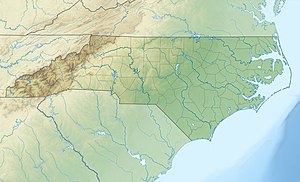Wolfpit Branch is a 2.55 mi (4.10 km) long 2nd order tributary to the Swannanoa River in Buncombe County, North Carolina.
| Wolfpit Branch Tributary to Swannanoa River | |
|---|---|
| Location | |
| Country | United States |
| State | North Carolina |
| County | Buncombe |
| City | Black Mountain |
| Physical characteristics | |
| Source | divide between Wolfpit Branch and Broad River |
| • location | about 3 miles south of Black Mountain, North Carolina |
| • coordinates | 35°34′19″N 082°20′30″W / 35.57194°N 82.34167°W[1] |
| • elevation | 3,640 ft (1,110 m)[2] |
| Mouth | Swannanoa River |
• location | Black Mountain, North Carolina |
• coordinates | 35°36′28″N 082°20′26″W / 35.60778°N 82.34056°W[1] |
• elevation | 2,270 ft (690 m)[2] |
| Length | 2.55 mi (4.10 km)[3] |
| Basin size | 1.78 square miles (4.6 km2)[4] |
| Discharge | |
| • location | Swannanoa River |
| • average | 3.20 cu ft/s (0.091 m3/s) at mouth with Swannanoa River[4] |
| Basin features | |
| Progression | Swannanoa River → French Broad River → Tennessee River → Ohio River → Mississippi River → Gulf of Mexico |
| River system | French Broad River |
| Tributaries | |
| • left | Briar Branch |
| • right | unnamed tributaries |
| Bridges | Amphitheater Lane, Lee Hall Circle, Blue Ridge Circle, Maney Lane, I-40 |
Course
editWolfpit Branch rises about 3 miles south of Black Mountain, North Carolina in Buncombe County on the Broad River divide. Wolfpit Branch then flows north to meet the Swannanoa River at Black Mountain, North Carolina.[2]
Watershed
editWolfpit Branch drains 1.78 square miles (4.6 km2) of area, receives about 50.0 in/year of precipitation, has a topographic wetness index of 275.42 and is about 91% forested.[4]
References
edit- ^ a b "GNIS Detail - Wolfpit Branch". geonames.usgs.gov. US Geological Survey. Retrieved 13 October 2019.
- ^ a b c "Black Mountain Topo Map, Buncombe County NC (Black Mountain Area)". TopoZone. Locality, LLC. Retrieved 12 October 2019.
- ^ "ArcGIS Web Application". epa.maps.arcgis.com. US EPA. Retrieved 12 October 2019.
- ^ a b c "Wolfpit Branch Watershed Report". Waters Geoviewer. US EPA. Retrieved 13 October 2019.

